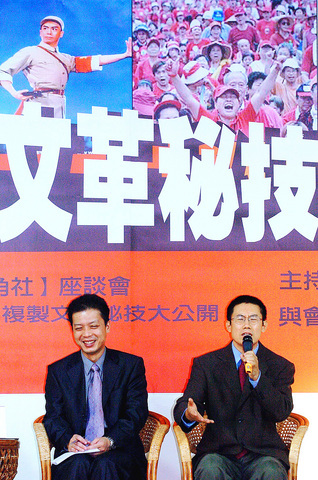Chinese dissident and writer Cao Changqing (
Cao said that there were many similarities between the anti-Chen campaign launched by former Democratic Progressive Party (DPP) chairman Shih Ming-teh (
Cao made the remarks at a forum hosted in Taipei by the media watchdog group Taiwan Society Herald (previously referred to as the "Bugle Society" in Taipei Times reports).

PHOTO: GEORGE TSORNG, TAIPEI TIMES
Cao, who experienced firsthand the cruelty of the Cultural Revolution as a young man, said that he had a sense of deja vu when seeing the anti-Chen campaign being waged in Taipei.
"It was a brutal age for China. It was an age full of hatred, anger and anxiety. I feel sad to see the `red' trend reappear in Taiwan," Cao said. "What I see in this anti-Chen campaign is that a handful of people are taking advantage of the masses to attain their political aims and destroy their political enemies, which is very similar to the Cultural Revolution."
Cao said that there were five ways in which the anti-Chen campaign echoed the Cultural Revolution.
First, the campaign was attempting to replace the rule of law with moral judgment and second, it was attempting to use mass movements instead of institutional reform to tackle problems.
Third, Cao said, the anti-Chen campaign was smearing its enemies with irresponsible accusations.
The campaign was convicting people in the court of public opinion, and employing the powerful influence of the mass media to create a "false majority," Cao said.
Noting that Chen was democratically elected as Taiwan's president with 6.4 million votes, Cao argued that Chen should be ousted through democratic procedures if, as Shih alleges, he is found to be corrupt.
"I think the pan-blue camp should take advantage of its legislative majority to revise the recall laws," Cao said. "It is unreasonable for Chinese Nationalist Party (KMT) Chairman Ma Ying-jeou (
Lu Shih-hsiang (
"No wonder some people say that the headquarters of the anti-Chen movement is not on Ketagalan Boulevard, but within some news stations," Lu said.
also see story:
Editorial: Who's afraid of lunch-box politics?

The High Prosecutors’ Office yesterday withdrew an appeal against the acquittal of a former bank manager 22 years after his death, marking Taiwan’s first instance of prosecutors rendering posthumous justice to a wrongfully convicted defendant. Chu Ching-en (諸慶恩) — formerly a manager at the Taipei branch of BNP Paribas — was in 1999 accused by Weng Mao-chung (翁茂鍾), then-president of Chia Her Industrial Co, of forging a request for a fixed deposit of US$10 million by I-Hwa Industrial Co, a subsidiary of Chia Her, which was used as collateral. Chu was ruled not guilty in the first trial, but was found guilty

DEADLOCK: As the commission is unable to forum a quorum to review license renewal applications, the channel operators are not at fault and can air past their license date The National Communications Commission (NCC) yesterday said that the Public Television Service (PTS) and 36 other television and radio broadcasters could continue airing, despite the commission’s inability to meet a quorum to review their license renewal applications. The licenses of PTS and the other channels are set to expire between this month and June. The National Communications Commission Organization Act (國家通訊傳播委員會組織法) stipulates that the commission must meet the mandated quorum of four to hold a valid meeting. The seven-member commission currently has only three commissioners. “We have informed the channel operators of the progress we have made in reviewing their license renewal applications, and

‘DENIAL DEFENSE’: The US would increase its military presence with uncrewed ships, and submarines, while boosting defense in the Indo-Pacific, a Pete Hegseth memo said The US is reorienting its military strategy to focus primarily on deterring a potential Chinese invasion of Taiwan, a memo signed by US Secretary of Defense Pete Hegseth showed. The memo also called on Taiwan to increase its defense spending. The document, known as the “Interim National Defense Strategic Guidance,” was distributed this month and detailed the national defense plans of US President Donald Trump’s administration, an article in the Washington Post said on Saturday. It outlines how the US can prepare for a potential war with China and defend itself from threats in the “near abroad,” including Greenland and the Panama

Taiwan People’s Party (TPP) Chairman Huang Kuo-chang (黃國昌) yesterday appealed to the authorities to release former Taipei mayor Ko Wen-je (柯文哲) from pretrial detention amid conflicting reports about his health. The TPP at a news conference on Thursday said that Ko should be released to a hospital for treatment, adding that he has blood in his urine and had spells of pain and nausea followed by vomiting over the past three months. Hsieh Yen-yau (謝炎堯), a retired professor of internal medicine and Ko’s former teacher, said that Ko’s symptoms aligned with gallstones, kidney inflammation and potentially dangerous heart conditions. Ko, charged with